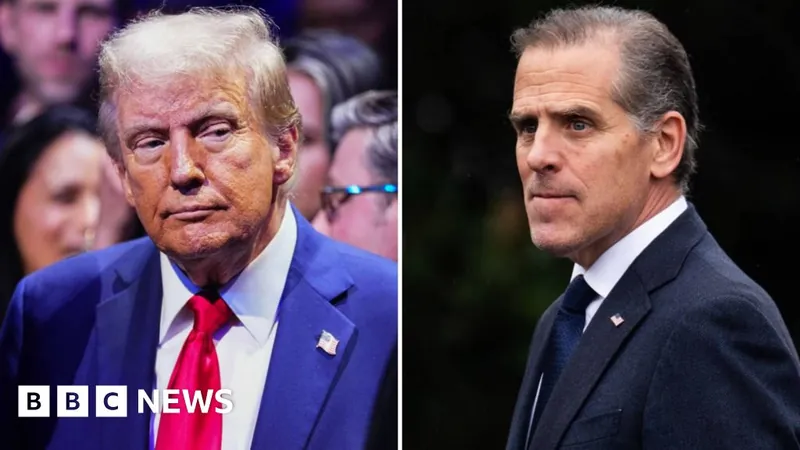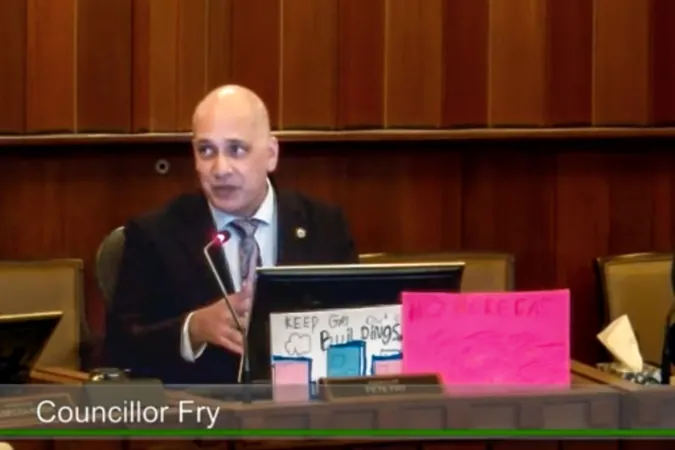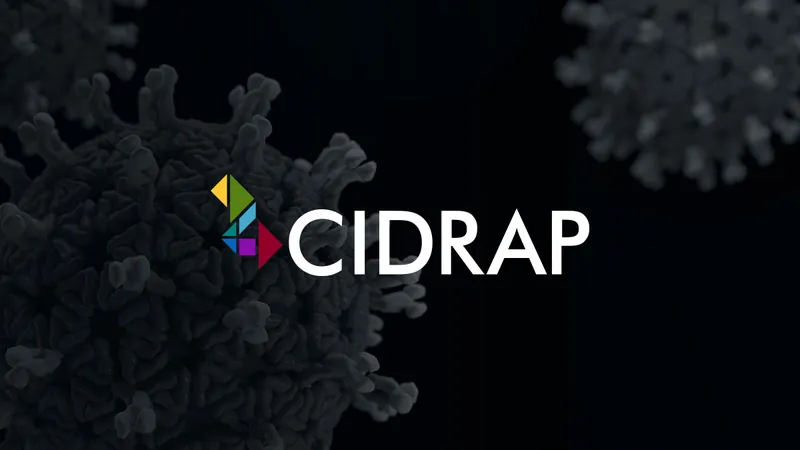
Unraveling the Intriguing Parallels Between Hunter Biden and Donald Trump's Legal Battles
2024-12-04
Author: Olivia
Introduction
In a striking twist of political fate, the legal challenges faced by Hunter Biden and former President Donald Trump reveal a series of uncanny similarities and significant differences that are capturing national attention. While their political ideologies diverge sharply, both have found themselves ensnared in high-profile legal troubles, leading to a narrative that poses questions about the intersections of justice, privilege, and accountability.
Pardon for Hunter Biden
Recently, President Joe Biden announced a bold and 'full and unconditional' pardon for his son, Hunter, asserting that the prosecution was driven by unfair targeting rather than the facts of the case. Biden emphasized that reasonable people would agree that Hunter was pursued solely due to his familial connection to the presidency, calling this situation 'wrong.'
Trump's Legal Battles
Critics of Hunter Biden's legal troubles point to a familiar refrain used by Trump—an invocation of a politicized judicial system. Trump's loud condemnation follows accusations of improper investigations, particularly what he terms a 'witch hunt' regarding the indictment related to hush-money payments made to adult film star Stormy Daniels. This case saw Trump convicted on multiple felony counts of falsifying business records to hide campaign finance violations.
GOP's Perspective
Prominent voices within the GOP, such as Senator Lindsey Graham, who has been a staunch ally of Trump, have echoed similar sentiments. Graham characterized the hush-money trial as an example of 'selective prosecution for political purposes,' drawing attention to allegations that these trials are motivated by partisan agendas rather than legitimate legal concerns.
Parallels Between the Legal Battles
Examining the intricate parallels between both the Hunter Biden and Trump legal battles, a few key similarities emerge. Notably, both cases saw legal actions unfold in 2024, years after the alleged incidents occurred—Trump's payments date back to 2016, while Hunter's gun application and tax fraud issues span from 2016 to 2019. Furthermore, both cases revealed unexpected turns; while speculation suggested the investigation into Trump may be dropped after a change in Manhattan’s district attorney, a last-minute collapse of a plea deal for Hunter underlined the complexities surrounding his circumstances.
Prosecutorial Focus and Legal Interpretations
Interestingly, both cases spotlight how prosecutorial focus can manifest under unusual legal interpretations. Trump's case concerned federal campaign finance violations that had previously been dismissed by federal attorneys, whereas Hunter's gun application woes are rarely pursued unless linked to more serious infractions. In a notable response to the recent pardon of Hunter Biden, Trump's legal team cited this as grounds for calling into question the legitimacy of the New York conviction against Trump.
Differences in Legal Situations
Despite these parallels, significant differences remain. Hunter Biden's predicament does not involve the convoluted web of public office that surrounds Trump, whose legal troubles extend beyond one case into various serious allegations. However, both premises invite speculation on the influence of political undertones shaping their respective prosecutions.
Expert Opinions
Experts like Kevin McMunigal from Case Western Reserve University assert that accusations of politicization in these prosecutions may not reflect reality. He emphasizes that while the statistic-laden statutes governing criminal behavior often lead to selective enforcement, the complexities of legal charges can escape public comprehension.
Implications for Both Politicians
As Hunter Biden faces no potential repercussions due to his father’s pardon, the implications for Trump are manifold, especially with his sights set once again on the White House. The ongoing legal challenges have brought to light concerns of a perceived double standard for the elite, feeding into the broader narrative of public distrust in America’s justice system. This sentiment is echoed by political analysts who argue that Trump’s critique of institutions has resonated with constituents feeling disenfranchised by the political landscape.
Intertwined Narratives
In an era marked by increasing skepticism toward government authority, both Trump and Biden have intertwined their narratives with themes of injustice and bias. Biden’s recent embrace of Trump-like rhetoric to justify his executive actions to shield his son may paradoxically rally more support for the systemic upheaval both politicians profess to navigate—a trend stirring further unrest in the mechanisms of American democracy.
Conclusion
As we continue to watch these developments unfold, the implications stretch far beyond their individual legal troubles, reflecting a deeper crisis within the fabric of American governance—one that may redefine how we perceive justice, privilege, and the role of politics in the law.









 Brasil (PT)
Brasil (PT)
 Canada (EN)
Canada (EN)
 Chile (ES)
Chile (ES)
 España (ES)
España (ES)
 France (FR)
France (FR)
 Hong Kong (EN)
Hong Kong (EN)
 Italia (IT)
Italia (IT)
 日本 (JA)
日本 (JA)
 Magyarország (HU)
Magyarország (HU)
 Norge (NO)
Norge (NO)
 Polska (PL)
Polska (PL)
 Schweiz (DE)
Schweiz (DE)
 Singapore (EN)
Singapore (EN)
 Sverige (SV)
Sverige (SV)
 Suomi (FI)
Suomi (FI)
 Türkiye (TR)
Türkiye (TR)